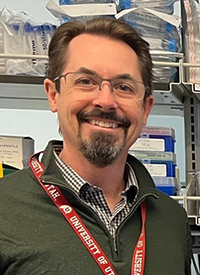New Digital Tool Aims to Improve Treatment Plans for Pediatric Cancer Patients
Jonathan Constance, PhD, and his team have created a digital pharmacology platform for assessing drug dynamics directly among children with cancer.
Jonathan Constance, PhD

Many medical treatments are designed for the average patient. But people are different, and understanding that is critical when it comes to cancer care. Precision medicine looks at variables such as genes, environments, and history to create the most effective treatment plans for patients.
Jonathan Constance, PhD, associate member in the Cell Response and Regulation Program at Huntsman Cancer Institute and assistant professor of clinical pharmacology at the University of Utah, seeks to better understand how medications can be used more safely and effectively in different patient populations, especially pediatric cancer patients.
“There are many critical knowledge gaps related to how drugs move or act,” Constance says. “The majority of drugs prescribed to children with cancer lack dosing information specific to these patients. This urgent, unmet health need results in off-label prescribing and puts these patients at risk.” Constance and his team focus on understanding factors that influence drug movement in the body, identifying early markers of drug toxicity and investigating the potential for drug-chemotherapy interactions.
Constance explains that drug dynamics in the body can be profoundly influenced by age, cancer type, and other medications. However, for most of the drugs used to treat children with cancer, population-specific data about drug movement is sparse. This prompted his team to develop a digital pharmacology platform that can be used to assess drug dynamics directly among children with cancer.
The platform is a data visualization and analysis tool that connects to a hospital’s electronic medical records to help identify blood draws that may qualify for further analysis. When a blood draw is taken that matches the researchers’ specifications, they can analyze it to help answer questions about how different drugs interact, how they impact patients with different conditions, and how long different medications stay in the blood.
“In this way,” Constance explains, “we can better understand the underlying issues concerning drug safety and efficacy, and importantly, have the data that can support optimization of drug use.”
By integrating “real-world” drug or biomarker concentration data with patient health records, researchers can perform detailed individual and population-specific studies for drug safety and efficacy.
“You really need population-specific information to understand what’s happening with the drug once the patient receives it,” Constance says.
While the digital tool his team created has been essential to discoveries, Constance adds that it could help answer many other critical questions in cancer care, like how to best preserve patients’ reproductive health.
“Being able to create a unique plan for each patient is the future of cancer care,” Constance says. “We are just getting started. We hope this platform will be able to aid clinicians in creating personalized treatment plans for their patients.”
“We are ushering in a new era as we research ways to make cancer treatment more precise and personalized,” says Neli Ulrich, PhD, MS, chief scientific officer and executive director of the Comprehensive Cancer Center and Jon M. and Karen Huntsman Presidential Professor in Cancer Research at the University of Utah.
In the end, it is all about finding the correct treatment plan for children with cancer. With this tool, researchers like Constance are working toward solutions.